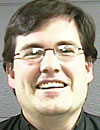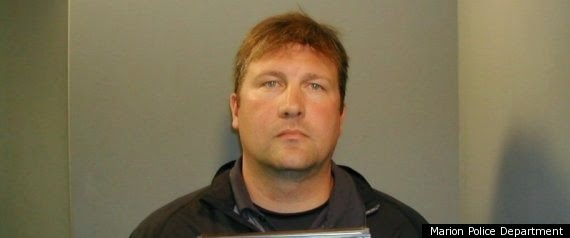| As of today, child-porn file swapper Hochmuth had this up on LinkedIn. Here is a link I obtained - listing other Lutheran offenders. |
Sunday, September 7, 2014
Collusion is Devastating
"It is very tempting to take the side of the perpetrator. All the perpetrator asks is that the bystander do nothing. He appeals to the universal desire to see, hear and speak no evil. The victim, on the contrary, asks the bystander to share the burden of pain. The victim demands action, engagement and remembering.”-- Judith Herman, Trauma and Recovery (1992)
“Collusion is usually far more devastating to victims than the primary abuse.” -- Dee Miller
What message do leaders send to clergy abuse victims by this conduct?
Answer: "What happened to you doesn't matter. Go away. Shut up."
What message do leaders send to clergy perpetrators by this conduct?
Answer: "You're safe with us. We'll cover for you."
“Collusion is usually far more devastating to victims than the primary abuse.” -- Dee Miller
What message do leaders send to clergy abuse victims by this conduct?
Answer: "What happened to you doesn't matter. Go away. Shut up."
What message do leaders send to clergy perpetrators by this conduct?
Answer: "You're safe with us. We'll cover for you."
When people collude, they are making themselves complicit in the cover-up of some sort of unethical conduct or in the protection of others who engage in unethical conduct.
We see the manifestations of collusion with clergy sex abuse through minimization, denial, rationalizing, victim-silencing, victim-blaming, and keep-it-quiet tactics. Collusion can be accomplished both consciously and unconsciously, intentionally and unintentionally. Even if someone says they didn’t intend to collude, their conduct may still be collusive. Many collude through silence and inaction. You won’t see collusion in what they do; you’ll see it in what they don’t do. Collusion often occurs behind closed doors. It’s a secretive sort of thing.
Here is an example:
I'm sure that everyone involved would say clergy sex abuse itself is a terrible thing. But look at the message it sends to a victim when something is done even unintentionally:
True case of a WELS pastor which happened a few years ago; local news media reported:
A Lutheran pastor was sentenced to two years in prison for possessing child pornography on his home computer. _________ pleaded guilty. The felony charge carries a maximum sentence of 10 years in prison. The prosecutor told the judge _____ had more than 70,000 images of young boys and other homosexual photographs on his computer. _____ is a pastor at ________.
As a victim, I struggle with the fact that he pleaded guilty; is a registered sex offender; had possible additional charges in a neighboring state; BUT, despite all that, is in the WELS Synod yearbook as being “retired”. He was an active pastor when this happened and instead of resigning he “retired” and, as of today, is still listed in the yearbook as retired. I struggle tremendously that the Synod knowingly lists a registered sex offender in their directory as if nothing happened; thus giving the appearance that he retired normally and there was no wrong-doing. I left God because I thought the church condoned what happened, so when I see this still in the yearbook, I continue to wonder. When you are struggling to come back to God, faith, and church, things like this (even if done unintentionally) are stumbling blocks. It puts doubts in your mind as to what is acceptable to the church.
Since the church considers itself to be “the family of God,” the parallels in how families deal with the shame of alcohol and other abuse are strikingly visible when we compare how families of “faith” justify such pervasive collusion with abuse.
It is generally recognized that enabling behaviors of the family members of a drug addict help to keep the patient in denial and out of treatment. By constantly "lowering the bottom" through rationalizing and covering for the addict, close relatives become a part of the problem. Generally, they are as resistant to seeing this as addicts are to facing their own addictions.
Family members do not collude intentionally. It's just that addicts are experienced con artists. They know how to play on the emotions of everyone. They are excellent actors, often even fooling themselves. By diverting attention, often to other issues, the addict keeps people from staying on course to clearly focus on the addiction as the root cause of their suffering.
The same is true for clergy perpetrators. A clergy perpetrator, usually with years of being in the public eye, is skilled at convincing almost everyone, including victims, that he is really innocent or just “made a mistake.” He uses his charisma and status to enhance this skill. Even if he breaks down and "confesses," he finds ways to minimize the problems and the harm already done. It takes an enormous amount of energy to find one’s way to reality through the fog of deception which has been created by the offender and the many colluders who have already been misled.
Certainly there has already been a lot of effort, on the part of most denominations, to consult attorneys and instruct clergy about the "new rules." Unfortunately, just like many spouses of alcoholics, the concerns seem much more about protecting the image of the "family" than protecting its most vulnerable congregation members.
When a patient enters treatment, everyone in the family minimizes. "It must be a chemical imbalance." Or "He'll be fine in a few weeks. After all she's only been drinking heavily for five years." The same dynamics are evident with clergy perpetrators and their colluders. "It's just the stress of the ministry. Treatment will be tough, but we are all going to expect total rehabilitation. With all the prayers going up for him, he'll be back in the pulpit in no time, being the great guy that he has always been.” Other common characteristics which colluding church leaders share with family members of substance abusers: distrust, high anxiety, conflict among formerly close colleagues, inconsistency, unpredictability, constant manipulation of the rules, and aggressive tendencies.
When an addict is finally forced into treatment, he seems to "clean up" quickly, but often does not stay sober for long, once he is released. It is common for him to look at the wife and children he has harmed and expect them to forget what he has done, welcome him home, and restore him to all the blessings of marriage and fatherhood while leaving behind their memories of neglect and/or abuse. Colluding family members have the same attitudes, thereby naively giving his denial support more than his sobriety. All of this is usually true, as well, of the clergy perpetrator and his colluders, as he tries to manipulate his way back into a trusting relationship with his congregation and profession.
“The world is too dangerous to live in -- not because of the people who do evil but because of the people who sit and let it happen.” -- Einstein
References:
http://stopbaptistpredators.org/whats_collusion.html
http://www.takecourage.org/parallels.htm




